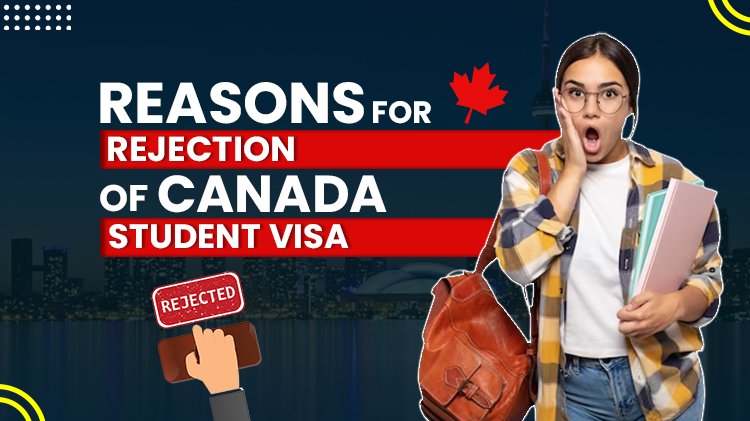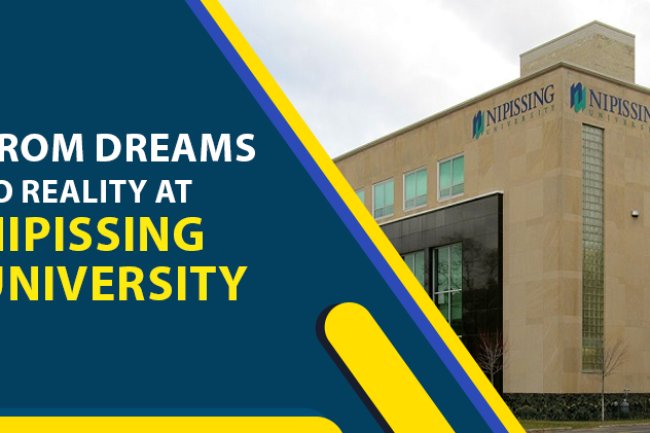Reasons For Rejection Of Canada Student Visa
There are several reasons why a Canadian student visa application might be rejected. It's important to note that the decision to grant or reject a visa is ultimately made by the Canadian immigration authorities, and each case is considered individually.

Many overseas students hope to pursue their further education in Canada, but getting a student visa is an essential first step. Although it is well known that Canada welcomes a lot of students, the fact of student visa denials cannot be disregarded. In this post, we will examine the frequent causes of Canada student visa denials and provide you with practical advice to help you steer clear of these mistakes and obtain your study permit.
Understanding Canada Student Visa Rejections
A student visa denial can be upsetting for prospective overseas students who have devoted time, energy, and money to their academic goals. The Global Case Management System (GCMS), which applicants can access, provides applicants with access to the reasons for refusal, even though they may not be included in the official correspondence from the immigration office. To avoid making the same errors in subsequent applications, it is crucial to understand the factors that led to visa rejections.
7 Common Reasons for Canada Student Visa Rejections
1. English Language Proficiency: A Gateway to Communication Competence
The attainment of the required IELTS score takes center stage for those students who are traveling the path of foreign education through the Student Direct Stream (SDS). This result demonstrates your command of the English language, a crucial aspect of your academic career. Failure to overcome this requirement may have effects that go beyond a simple setback; it may bring about the unwanted threat of a student visa denial. Your language abilities are crucial to being able to speak clearly, understand lectures, participate in conversations, and do well in your schoolwork. Therefore, fulfilling the IELTS requirement is more than just a formality; it's your ticket to confidently navigating the academic terrain.
2. Insufficient Funds: The Financial Foundation of Your Journey
The ability to thrive in a foreign environment is just one aspect of the Canadian ideal, in addition to academic pursuits. Canadian authorities need concrete proof of your financial preparedness to support this aim. The demonstration that you have the money to pay for the first year's costs is proof that you have the means to achieve both academically and financially.
Inadequate or insufficient financial documents can potentially stymie your entire Canadian experience in addition to being a bureaucratic burden. Your success is paved with stepping stones, each of which must be carefully positioned in order to create a strong foundation. These stepping stones include tuition fees, lodging costs, and daily expenses. Failure to do so could not only lead to rejection but also detract from the overall experience of your international trip.
3. Transparency about Return Plans: Bridging the Temporal Divide
The decision to pursue an education abroad is made with the knowledge that the trip would only last a short while. After all, a study permit is a temporary privilege. Although you may picture a future filled with wisdom and experiences, the fundamental truth still holds true: you are here to go back. Adequate proof of your intention to return home after your studies is not some obscure prerequisite; rather, it is an affirmation that your academic journey is a step toward enhancing your home nation. Your visa application may be ambiguous and tainted by lack of transparency, which raises questions about your motivations. Not only must you adhere to the rules, but you must also demonstrate your sincere desire to advance your country and your dedication to the larger global society.
4. Choice of Programs: Aligning Education and Ambition
Not only are immigration officials looking at your application's documents, but they are also trying to piece together the story of your academic journey. Your selection regarding your study plan is part of a bigger academic narrative; it is not a stand-alone action. Canadian authorities are aware of narrative coherence, therefore they make sure that your academic path corresponds with your prior successes and long-term goals. Questions may be raised by a careless change in your job path, a sudden deviation from your academic path, or an obvious gap in your professional history. Your study plan is a compass that points you in the right direction; making sure it is in perfect alignment is essential to avoiding visa denials. Your application is more than just a list of requirements; it is a flawless testimony to your forethought, tenacity, and desire.
5. Acceptance Letter: A Confluence of Opportunity
You and your preferred Designated Learning Institution (DLI) work together on your path to obtaining a student visa for Canada. A letter of acceptance is more than just a piece of paper; it's a handshake that signifies the two parties' shared conviction that your academic career will flourish in the institution's revered classrooms. Meeting the DLI's entrance requirements is a sign of your dedication to the joint endeavor, but this alliance is built on a foundation of prerequisites. Your letter of acceptance is a component of a larger agreement; it is not a stand-alone ticket. By meeting the requirements of the school, you are laying the groundwork for an academic journey that offers development, empowerment, and fulfillment rather than just complying with a formal obligation.
6. Insufficient Documentation: Precision in Paperwork
The process of obtaining a student visa for Canada requires precision. Every piece of information—documents, details, and affirmations—contributes to the whole of your application. Lackluster or inaccurate documentation is more than just a procedural mistake; it poses a risk to the integrity of your program. Each paper you turn in is more than just a physical thing; it's a declaration of your commitment, dependability, and attention to detail. A student visa application is more than just a formality; it's a chance to demonstrate your ability to follow rules and regulations, which will be important for your academic career as well. Your application is more than just a stack of papers; it's a portfolio that demonstrates your promise as an honest, reliable, and hardworking student.
7. Low Employment Prospects in Home Country: The Boundaries of Intent
Education abroad is a journey with a return ticket to your home country, not a one-way trip. The major goal of the attempt is to broaden your horizons, but it is still crucial that you eventually want to help your own country thrive. Inadvertently raising questions about your commitment to the return journey may result from your inability to demonstrate realistic work prospects in your native country. Authorities in Canada want proof that you're not merely learning, but also developing the ability to spark constructive change in your own country. Lack of opportunities is more than just a side note; it's a potential roadblock that can prevent you from completing your degree and finding a permanent home. Your application isn't just a request for admission; it's also a narrative about your aims and goals, one that should come to a satisfying closure.
Navigating the Student Direct Stream (SDS) in Canada
The Student Direct Stream (SDS) is intended to speed up the application procedure for study permits. Legal residents of a few nations, such as those in India, Pakistan, China, and other places, may access it. Students applying to post-secondary designated learning institutions (DLIs) in Canada should use this stream.
Tips for a Successful Canadian Student Visa Application
1. Comprehensive Document Checklist: Navigating the Path of Preparedness
It takes careful planning to start your road toward obtaining a student visa for Canada. Your guide is the official Government of Canada website, which provides a thorough list of necessary paperwork. Each document is more than simply a piece of writing; it tells a story about you and demonstrates your maturity, ambition, and commitment. This list is more than just a compilation; it serves as a compass to help you navigate the maze of red tape. The smallest detail can have far-reaching effects in this world. Your document checklist serves as more than simply a check against omissions; it also serves as a tool in your toolbox for showcasing your precise approach to the chance that is waiting for you.
2. Thorough Application Form: Precision as a Prelude
The outline of your educational experience in Canada is contained inside the application form's boundaries. On the canvas of your aspirations, each field represents a brushstroke. This form represents you to Canadian immigration authorities, thus it's important to complete it completely. Each input is more than just a piece of information; it's a declaration of your meticulousness, dedication to transparency, and observance of rules. The importance of accuracy extends beyond its linguistic component and includes the narrative it shapes. A mistake is more than just a weakness; it may become a roadblock on your way. Your application form serves as more than simply a collection of your responses; it also serves as the start of a new chapter in your life.
3. Effective Statement of Intent: Crafting Your Academic Symphony
The statement of purpose is more than just a piece of writing; it's your opportunity to express your aims, passions, and goals. It is expertly written and goes beyond simple words to represent your academic career as a symphony. A succinct, well-written message invites Canadian immigration authorities to see the passion driving your goal, not merely as a formality. It's a chance for you to tell your narrative and connect your aspirations to Canada's intellectual fabric. In addition to being a squandered opportunity, an imprecise or weak statement raises the possibility of a mismatch between your intentions and the perception of the authorities. Your statement of intent is more than just a part of your application; it's your stamp of approval on the picture of your goals.
4. Attach Acceptance Letter: A Key to the Door of Opportunity
Your admission letter is more than just a piece of paper; it serves as a doorway to the future you want. This letter from your designated learning institution (DLI) is a certification of your academic alignment rather than only an invitation. The inclusion of it in your application signifies that you are seeking membership in a community of learners rather than simply being accepted. Beyond just the words you write, the letter serves as a representation of your dedication to improving your grades and the confidence the school has in you. Its absence represents a gap in your application as well as a component of the puzzle representing your goals. Your admission letter is more than just a piece of paper; it's a metaphorical key that opens up doors of possibility.
5. Financial Preparedness: The Currency of Assurance
Financial preparation is more than just having money in the bank; it's about showing that you are committed to your journey. Your bank statements are more than just a list of numbers; they are a reflection of your aptitude for juggling daily obligations. They represent your insight, accountability, and ability to succeed in a new situation beyond the numbers. It's a pledge that you won't only survive, but also thrive, to make sure that these statements show adequate funds. Financial readiness goes beyond only meeting regulatory requirements; it also represents an investment in your capacity to take in the academic and cultural riches that lie ahead of you.
6. Travel History: Mapping Your Global Odyssey
Your travel history is more than simply a list of places you've been in order, it's a story about your epic journey around the world. A true testimonial to your experience, flexibility, and exposure is accurate documentation of your prior travels. This history shows your capacity for accepting different cultures and your willingness to explore new frontiers, not just by detailing your locations. An incomplete or inaccurate travel history is more than just a typo; it could indicate a gap in your account, which Canadian authorities are eager to learn. Your travel log is more than simply a list of destinations; it's a living record of your journey of personal development.
7. Medical Exams: Nurturing Well-being, Ensuring Readiness
It is a commitment to your health and the health of the community you are joining that you complete medical exams. These tests serve as more than simply medical records; they also serve as evidence of your physical fitness for the intellectual and cultural journey that lies ahead. Completing these tests on time will show that you appreciate the value of health and your responsibilities as a global citizen, not merely that you are complying with the requirements. Medical examinations are more than simply a formality; they represent a commitment to placing your health and the health of those around you first.
The Role of Study Abroad Consultants
It might be hard to navigate the many requirements of a Canadian student visa application. Your chances of success might be greatly increased by seeking advice from study abroad advisors like University Bureau. These professionals help students submit applications to respected Canadian and international universities. They offer advice on application strategy, interview practice, and documentation requirements.
Conclusion
International students have unmatched chances to Study in Canada, but obtaining a student visa is an essential first step. By being aware of the typical justifications for student visa denials and putting the supplied advice into practice, you may greatly improve your chances of a successful application. Keep in mind that consulting with study abroad specialists can help you with the application process and offer professional advice. You can confidently start your educational adventure in Canada if you are determined, prepared, and supported by professionals.
What's Your Reaction?





















